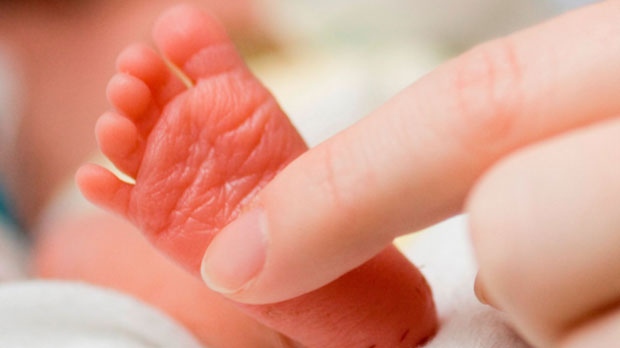Calgary obstetrician sees concern in COVID-19 exemption, but says rules are in place
After details of a COVID-19 exemption order in place for certain groups of people at labour and delivery wards in Alberta hospitals came to light, one doctor says precautions are in place to prevent any danger.
Back in July, Alberta's top doctor Dr. Deena Hinshaw signed an exemption order for "essential support persons" for obstetrical patients, allowing them access to a hospital facility, even if they were symptomatic or tested positive for COVID-19.
Dr. Stephanie Cooper, a high-risk obstetrician at Foothills Medical Centre in Calgary, says she understands how people could be concerned about the document as it's written.
However, she says that the protections put in place by Alberta Health Services are effective at preventing any problems from occurring.
"As written, I can understand and would think it means that COVID-positive support people are allowed to come up to the labour and delivery unit and be present there as well as in the post-partum unit just as, sort of, the general rule – as the norm," she told CTV News in an interview on Sunday. "That is not actually what happens."
Cooper also said that the idea of COVID-19 patients sharing a room with post-partum patients who are COVID-negative isn't true either.
She says she also received a letter recently that emphasized the fact that "exceptional circumstances" must exist before an exemption is granted.
"They would require high level approval from infection, prevention and control as well as site administration.
"So, it does say there is a possibility but, in practically, in my experience I have not seen that happen except in one exception."
Cooper said that occurred when a patient was delivering at the hospital. While admitted, they developed symptoms, were swabbed and was found to be COVID-positive.
"The support person is not sent home at that point, even though they are considered to be a close contact of someone with COVID."

'VERY ROBUST' HEALTH PROTOCOLS
Cooper says staff her field are "overly cautious" when it comes to the symptoms of COVID-19 appearing in patients on the unit.
If someone even develops a fever, the support person and anybody in the room is automatically assumed to have COVID and that room is made into an isolation room, she said.
"The support person is not allowed to leave the room and then we wait to get the swab back," she said. "After this length of time – 18 plus months – we have very robust PPE requirements in the sense of the doffing and the donning that if we're going in and taking care of a COVID person, the staff is taking off their PPE and is not going to take it from one room to the next."
However, there is the possibility for unvaccinated families to be in the same room as vaccinated families, Cooper says. They could also be in close contact with each other in common areas throughout medical facilities.
"That does happen, but not if anybody is symptomatic. If anybody is symptomatic or known to have COVID, then they are placed in isolation rooms."
Cooper says the exemption was also drafted several months ago, before the fourth wave hit Alberta.
"The reason that Deena Hinshaw wrote that letter probably came about weeks prior to that, before even delta was on the horizon.
"In early July, we were seeing cases that were very few in the community and we hadn't really recognized how contagious delta was and delta does make people sicker, especially post-partum women."
CTVNews.ca Top Stories

Ford pushes for 'more proactive' border action after Trudeau meets with premiers about Trump
Ontario Premier Doug Ford is calling on the federal government to 'take a more proactive approach at the border' following a call Wednesday night between Prime Minister Justin Trudeau and all 13 premiers to discuss U.S. president-elect Donald Trump's tariff threat.
Liberals table GST holiday legislation, putting $250 rebate on backburner
Prime Minister Justin Trudeau's promised holiday consumer relief package has been split in half. After NDP Leader Jagmeet Singh said his party was only ready to help pass the GST/HST holiday portion of the affordability announcement, Deputy Prime Minister and Finance Minister Chrystia Freeland tabled legislation Wednesday that only seeks to enact that measure.
Missing hiker found alive after 50 days in northern B.C. wilderness
A missing hiker who spent 50 days alone in the frozen wilderness of northern British Columbia has been found alive.
Boeing plane makes emergency landing at Montreal's Mirabel airport after landing gear malfunction
No injuries were reported after a Boeing 737 was forced to divert to Mirabel airport after the aircraft experienced a technical issue with the landing gear.
Montreal billionaire Robert Miller could have as many as 100 victims, lawyer says
A Quebec judge is hearing arguments this week in a class-action lawsuit application against Montreal billionaire Robert Miller over allegations he paid minors for sex.
It's expensive to visit the Maldives. Now it's more expensive to leave, too
The Indian Ocean archipelago nation of the Maldives, known for its white sand beaches and coral reefs, has just increased the price it costs to leave.
Two Canadians arrested for failed murder plot in California
Two men who travelled from Canada to Monterey County have been arrested and accused of attempted murder after a triple-stabbing Sunday.
Northern lights forecast to fill the skies in Midwest U.S., some areas in Canada
The northern lights could be visible for residents in northern and upper Midwest states in the U.S. as early as Thursday, including some Canadian provinces.
Ontario to match GST holiday by removing provincial sales tax on some items
Ontario says it will match the federal government’s two-month GST holiday by removing provincial sales tax (PST) from items that are not currently covered by existing provincial rebates.


































